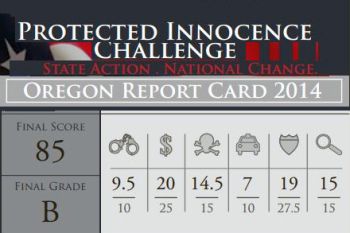
Publisher:
Bonnie King
CONTACT:
Newsroom@Salem-news.com
Advertising:
Adsales@Salem-news.com

~Truth~
~Justice~
~Peace~
TJP
Nov-06-2014 16:40

 TweetFollow @OregonNews
TweetFollow @OregonNews
Is Oregon Finally Out Of Sex Trafficking Hotseat?
Salem-News.comA New Study by Shared Hope International Shows Oregon’s Efforts May be Paying Off
 Oregon report card, 2014 |
(WASHINGTON D.C.) - Portland is believed to have the highest rate of strip clubs per capita and has been dubbed “Pornland,” but a new study by Shared Hope International shows Oregon’s effort to crack down on trafficking may be paying off.
According to the Protected Innocence Challenge, a report on the sufficiency of state laws relating to domestic minor sex trafficking in the U.S., Oregon raised its grade from a “D” to a “B” in 2013 with continuing efforts to strengthen state laws. Watch the release of the state grades.
Historically, Oregon’s efforts to strengthen anti-trafficking laws paled in comparison to neighboring Washington. Washington created the first state Task Force Against Trafficking of Persons, enacted one of the first state trafficking laws, and in 2007 Washington overhauled its laws criminalizing commercial sexual exploitation of children by removing these penalties from the prostitution context and clarifying that these are crimes of sexual exploitation.
As Washington strengthened its laws, enabling more aggressive investigation and prosecution traffickers went searching for states with lower risk and greater tolerance, putting Oregon at risk of attracting Washington’s trafficking market.
Prior to 2013, Oregon law enforcement and prosecutorial agencies’ proactive engagement in anti-demand efforts were impacted by weak state laws that failed to adequately penalize buyers, individuals who purchase sex acts from minors and fuel the sex trafficking industry by making it a profitable market.
Previously, the crime of “purchasing sex with a minor” (ORS 163.413) was only a misdemeanor offense. This posed significant challenges for law enforcement agencies in substantiating the deployment of limited law enforcement resources to identify and investigate buyers who would only be charged with a misdemeanor.
The District Attorney’s Office received a limited number of buyer cases for prosecution. While the agency worked creatively within existing laws to bring charges that would carry significant penalties to buyers, buyers were not charged with “sex trafficking.”
By not charging buyers under sex trafficking laws, the scope of the crime could not be accurately measured, buyers were at risk of receiving lighter penalties for peripheral crimes, and victims may have faced barriers to accessing crime victim protections.
However, in 2013, thanks to the support of the Multnomah County District Attorney’s Office, the Oregon District Attorney’s Association, the Portland Police Bureau, the Multnomah County Sheriff’s Office, and law enforcement agencies across the state, the Oregon Legislature passed a new law that elevated the crime of purchasing sex with a minor to a felony.
Under the new law, the Portland Police Bureau has conducted proactive sting operations to identify buyers seeking to purchase sex with a minor and to hold buyers accountable through felony prosecutions.
While Oregon made significant strides to enact stronger penalties, the state now faces the challenge of implementation. According to Shared Hope International’s Demanding Justice report, a study on buyer penalties in four target sites, over a quarter of Portland buyer cases concluded with a dismissal.
Portland had the highest rate (62.5%) of cases that concluded with a buyer of sex acts with a minor receiving a misdemeanor conviction, a stark contrast from Seattle which has the highest rate of felony convictions for buyers of the four target sites. The data from Portland highlights the importance of strengthening state laws and enforcing them to the fullest extent of the law.
The Protected Innocence Challenge was first conducted in 2011 and found 26 states earned failing scores. However, after four years of sweeping legislative advancements, 42 states have raised their grade. Three states, Louisiana, Tennessee and Washington, have earned “A” grades.
Here is Oregon's Report Card.
Only nine states have not raised their grade since 2011 and California, Maine, Michigan and South Dakota are the only remaining states earning failing scores.
 |
Articles for November 5, 2014 | Articles for November 6, 2014 |



Salem-News.com:

Terms of Service | Privacy Policy
All comments and messages are approved by people and self promotional links or unacceptable comments are denied.
reader 2 November 8, 2014 6:16 am (Pacific time)
This reporting seems pretty exaggerated and irresponsible.
reader November 7, 2014 9:15 am (Pacific time)
Please review the Demanding Justice report by Shared Hope before citing it in future articles. Their research method was dubious at best and I strongly question the "findings" they present. Portland's analysis was based on six cases and the researchers did not consider variables such as witness availability, evidence, and other factors that inform what to charge the buyer with. I encourage you to read the responses by DAs in Phoenix and Seattle to this "study". The researchers at Shared Hope had a narrative and used the data when convenient to advance it. Also, the "fact" that Portland has more strip clubs per capita was first presented by WWeek over a decade ago and is not based on any data. It has now been repeated enough that it is taken for granted.
[Return to Top]©2026 Salem-News.com. All opinions expressed in this article are those of the author and do not necessarily reflect those of Salem-News.com.